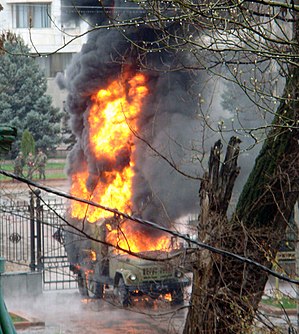2010 Kyrgyzstan crisis
| Second Kyrgyz Revolution | |
|---|---|

An opposition-captured vehicle burns near the capitol building during citywide protests and riots in Bishkek, Kyrgyzstan on 7 April 2010. Guards can be seen to the left of the smoke.
|
|
| Date | 6 April 2010 – 14 December 2010 (8 months and 8 days) |
| Location | Kyrgyzstan |
| Methods | Uprising, protests, |
| Result |
|
| Casualties | |
| Death(s) | ~2,000 people |
The Kyrgyz Revolution of 2010, also known as the Second Kyrgyz Revolution, began in April 2010 with the ousting of Kyrgyz president Kurmanbek Bakiyev in the capital Bishkek. It was followed by increased ethnic tension involving Kyrgyz people and Uzbeks in the south of the country, which escalated in June 2010. The violence ultimately led to the consolidation of a new parliamentary system in Kyrgyzstan.
During the general mayhem, exiles from the Uzbek minority claim they were assaulted and driven to Uzbekistan, with some 400,000 Kyrgyzstani citizens becoming internally displaced. Victims interviewed by media and aid workers testify to mass killing, gang rape and torture. Then-head of the Interim government Roza Otunbayeva indicated that the death toll is tenfold higher than was previously reported, which brings the number of the dead to 2,000 people.
During the winter of 2009–2010 Kyrgyzstan suffered from rolling blackouts and cutoffs occurring regularly while energy prices rose.
In January 2010 Kyrgyzstan sent a delegation to China to discuss improved economic relations. Kyrgyzstan national electric company Natsionalnaya electricheskaya syet and the Chinese Tebian Electric signed a $342 million contract to build the Datka-Kemin 500 kV power transmission lines. This would have reduced Kyrgyzstan's dependence on the Central Asian power system, and energy dependence on Russia. The delegation was led by Bakiyev's son.
...
Wikipedia
